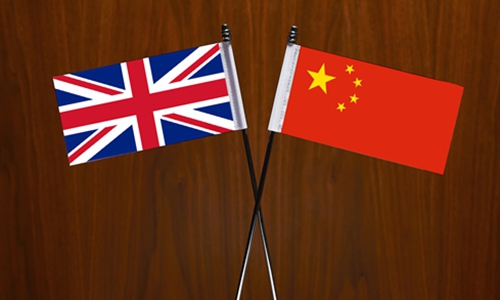Little effect on China as UK ends extradition treaty with HKSAR to please US: experts
By Chen Qingqing Source: Global Times Published: 2020/7/21 0:32:14

China UK flag Photo: GT
The day US Secretary of State Mike Pompeo arrived in London, kicking off his short visit to the UK amid deteriorating China-UK ties, the British government announced that it would suspend its extradition treaty with the Hong Kong Special Administrative Region (HKSAR), a move which further enflames the row with China.
Such a move could be seen as "a gift" that Boris Johnson offered to the Trump administration in exchange for more bargaining chips for a possible US-UK trade deal, which may further jeopardize ties with China. Experts said it's more of a "symbolic" move rather than one with real impact.
"The government has decided to suspend the extradition treaty immediately and indefinitely," UK Foreign Secretary Dominic Raab said on Monday, and the UK became the third country to take such move after Canada and Australia, with the aim of opposing the national security law for Hong Kong.
The HKSAR has extradition agreements with some 20 countries, including the US, the UK, Canada, Australia and Germany. Half a month after China's national security law for HKSAR came into force, Canada became the first country to announce it was ending the treaty with the HKSAR.
Chinese officials and scholars earlier warned that ending the extradition agreement with the HKSAR is extremely dangerous as it is very likely to further undermine China-UK relations.
The UK is going to pay the price for its moves against China, and the Chinese government will soon take countermeasures in response to the UK's latest move, some observers said.
A declining UK has been facing growing pressure from the US to "pick a side" on the Hong Kong matter. However, such a move has more "symbolic" implications than a real impact on the HKSAR and the Chinese mainland, Li Xiaobing, an expert on Hong Kong, Macao and Taiwan studies at Nankai University in Tianjin, told the Global Times on Monday.
"Although those countries ended extradition treaties with the HKSAR, if they continue maintaining a relationship with China, we always have ways of holding fleeing fugitives accountable," Li said.
Ending the extradition agreement with the HKSAR won't have a significant impact on law enforcement in the city, and countries that took such reckless moves may face greater risks, as those fugitives who violate the law in Hong Kong could flee to countries like the UK, which will likely become a crime haven, some analysts said.
However, law enforcement authorities in Hong Kong and the Chinese mainland will always be able to hold fugitives accountable through different means, such as international police cooperation, John Lee Ka-chiu, Hong Kong Secretary for Security, told the Global Times in a recent interview.
RELATED ARTICLES: